Though economically they might not be the best business in town, high school sports help prepare young people for the future.
| 2017 Q3 | story by Craig Leener, photos by Steven Hertzog
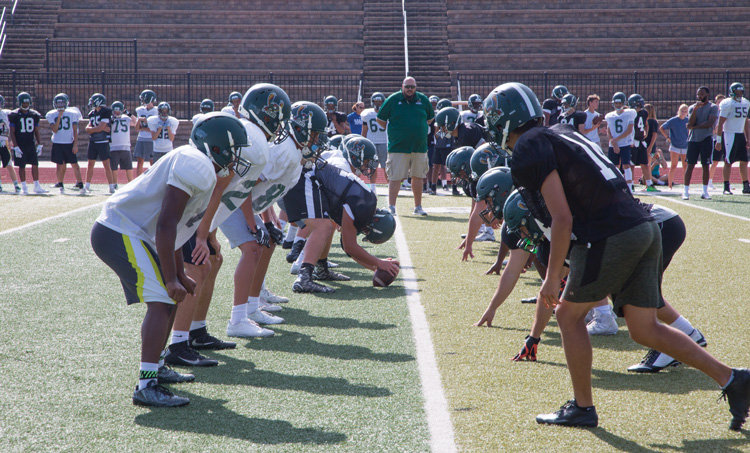
Free State football practices for their season opener.
Imagine for a moment you had the task of presenting a proposal to a venture capital (VC) group for the business of running the combined 56 individual sports programs that make up high school athletics in Lawrence.
On the plus side of the ledger, there would be line-item funding from the district office, fees collected from student activity tickets, modest gate receipts, concessions, well-meaning grassroots fundraisers and intermittent monetary donations from parents.
In the minus column, you would find uniform and equipment expenditures; field, gymnasium and swimming pool operating expenses; transportation costs; and wages for an array of coaches, referees, medical personnel, teachers, guidance counselors, custodians and administrators.
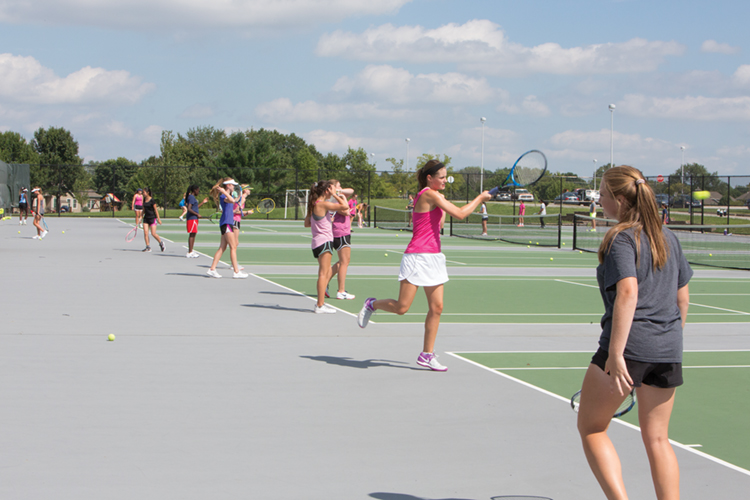
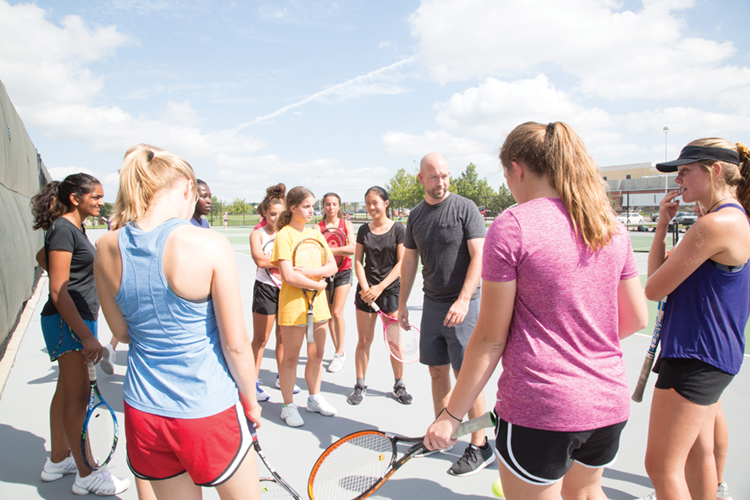
FSH girls tennis practice as coach Aaron Clark speaks to the team.
The likely response from the VC organization’s board of directors? “Don’t let the door hit you in the wallet on the way out, and we don’t validate parking.”
Here’s the bottom line reality check: If Lawrence’s high school sports programs were run like small businesses, they would surely fail.
But, thankfully, there’s a third column in the equation. It’s the collection of intangible, difficult-to-measure benefits that are derived by students, parents, educational institutions and the local community. It’s an enterprise where everyone in this city of 90,000 people is a shareholder.
“As the students benefit, so, too, do parents and the community,” Free State High School athletic director Mike Hill says.
With 1,800 students, Free State High is the city’s largest public high school. The school was built in 1997 in response to overcrowding at now-rival Lawrence High School.
On a historical note, the school’s name originated from the term “Free State,” which referred to a U.S. state without slavery. Free-staters were settlers in the 1850s who successfully opposed the expansion of slavery into Kansas and did not want the state admitted to the Union as a slave state. Kansas became the 34th state in 1861.
“We provide a venue for kids to grow,” says 48-year-old Hill, a lifelong resident of Lawrence who just completed his 20th season as the school’s head baseball coach. “That is a direct benefit to their parents and the community, whether you consider that from an economic perspective, meaning better workers and more consumers, or from the perspective of a more educated populace.”
The Free State Firebirds compete in the Sunflower League and have notched 11 state championships. Hill believes that education-based athletics at Free State High provide an avenue for kids to have fun and create memories.
“Everyone, parents, the community at-large and, most importantly, the kids themselves benefit from that,” he says.
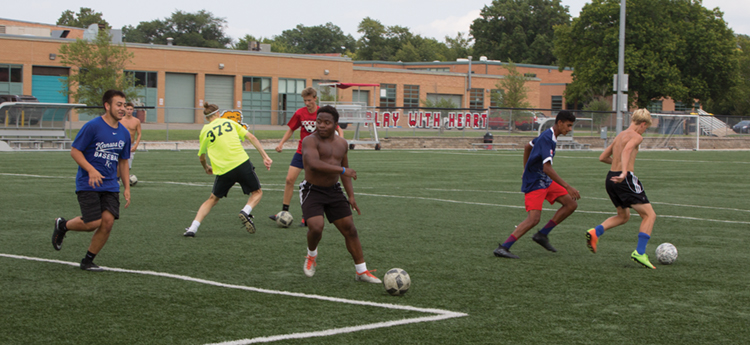
LHS soccer team run their drill called “keep away”.
The city’s other public high school is Lawrence High. Established in 1857, when classes were originally held in the basement of a Unitarian church, the school is now home to 1,600 students.
Lawrence High athletics programs have won over 100 state championships, more than any other high school in the state and one of the highest totals in the nation.
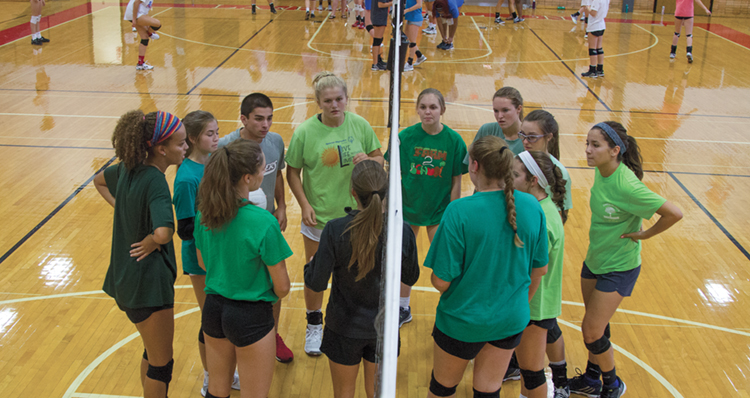
Coach Stephanie Scarbrough speaks with her LHS varsity volleyball team.
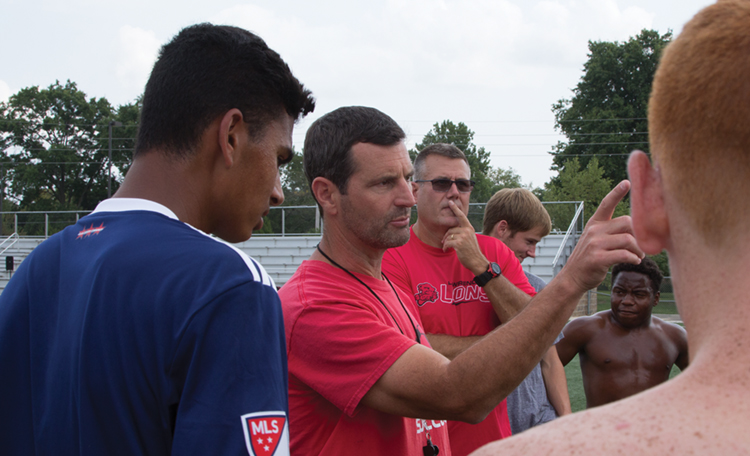
LHS head soccer coach Mike Murphy and assistant coach Stan Rasmus¬sen talk with their team during practice.
The school collected its first state championship in 1914. The sport? What else—boys basketball. The Lawrence High faithful would argue it’s no coincidence the school’s basketball gym is a mere mile from Allen Fieldhouse, on the campus of the University of Kansas.
Notable Lawrence High graduates include philanthropist and Booth Family Hall of Athletics founder David Booth, environmental activist Erin Brockovich and Danny Manning, who led KU’s basketball team to the NCAA title in 1988.
Bill DeWitt is entering his fifth year as Lawrence High’s athletic director and assistant principal.
DeWitt, 44, says the Chesty Lions compete in 22 sports programs within the Sunflower League, two fewer than Free State High. He says monetarily, the benefits are a blip on the overall school budget, as proceeds are put back into the programs for officials, entry fees and operating expenses.
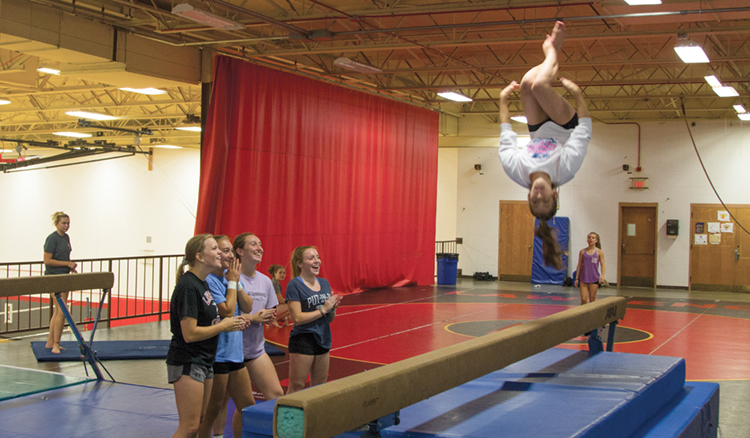
Eden Kingery of LHS performs a back flip on the balance bar as gymnists from both FSH and LHS cheer her on.
DeWitt believes in the importance of student-athletes having the humility to lend their talents to a sport where they may not be the star but can play a role in helping others who might be.
“Educationally, the benefits are immeasurable, and lessons learned carry over into life experiences,” DeWitt says. “Learning how to win with excellence and lose with excellence are skills that are horribly lacking in society today. We try to run our programs with a philosophy that when we visit other schools, we play in a way that people respond by saying, “Look at those kids at LHS—good things must happen there.”
Excellent stuff is also happening at Bishop Seabury Academy, a private, Episcopal middle school and high school with a total population of 210 students, 110 of whom are in grades 9 through 12. The school is named after Samuel Seabury, first bishop of the Episcopal Church in the U.S. and a British Loyalist during the American Revolution.
Bishop Seabury student-athlete Chris Green is a shooting guard on the basketball team. He also competes in soccer in the fall and golf in the spring.
“For my teammates and me, team sports is about building chemistry and learning how to cooperate with each other as we work toward a common goal,” the 17-year-old junior says.
Eric Nelson, 52, has been Bishop Seabury’s athletic director for nine years. Unlike Hill and DeWitt, who both grew up in Kansas, Nelson found his way to Lawrence by way of Arizona, Colorado, Washington and the U.S. island territory of Guam in the Western Pacific. He then retraced his steps back to Colorado and Washington before setting deep roots in the Sunflower State.
Nelson says the cornerstones of Bishop Seabury’s athletics program are working collectively to achieve a goal, striving for excellence and pushing beyond perceived limits and barriers.
“All of these phenomena are life success skills that any employer would desire,” he says.
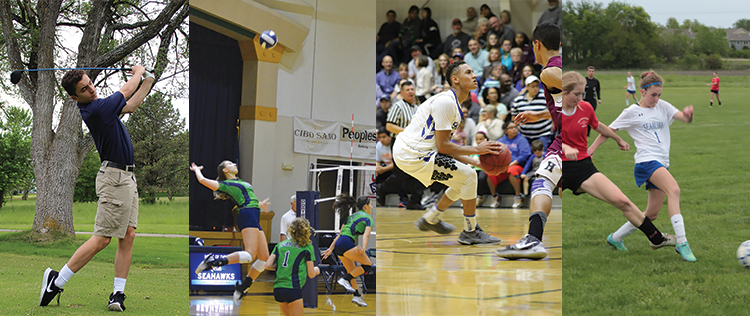
Bishop Seabury Academy golf, volleyball, basketball and soccer in action from the 2016-17 seasons. Photos courtesy Bishop Seabury.
Nelson believes athletics make the educational experience more personal by shrinking the school down, where deeper friendships can develop. He knows firsthand because he is the parent of two student-athletes at the school.
“It’s meaningful to see my own children competing, learning and having fun in their sports,” Nelson says. “And the sports programs give the school’s parents a chance to bond, as well. It is a fun social event to go to a game and sit with the other parents. Without these opportunities, they may never cross paths.”
Seabury also offers a unique opportunity to its student-athletes: It does not cut players in any sport. That means many kids get the opportunity to compete in sports that they are not committed to year-round. That doesn’t happen at the two larger high schools, where the number of roster spots on the varsity basketball team, for example, is finite at 12 players. And, in a college town where the sport of basketball is king, the school offers the chance for any aspiring round-baller to compete.
“Seabury adds opportunity for an additional number of kids, in many cases allowing a student to have a career who may not be able to compete for a 1,600-student high school,” Nelson says. “The school is perfect for the academic kid who also is competitive.”
It’s one thing to get an administrator’s take on the power and value of the high school athletic experience. It’s quite another to hear it directly from a student-athlete who must strike a daily balance between his academic obligations and the needs of his team.
But before you do, imagine again for a moment that the same student-athlete is one day working alongside you at the bank, the hospital, the car dealership or the university.
“I’m working hard everyday trying to be a good leader for my teammates,” says 18-year-old Simon McCaffrey, senior point guard for the Free State High basketball team. “I’ve got to make sure I’ve got everyone’s back.”
McCaffrey’s viewpoint is grounded in the essence of what high school sports programs are all about. It is the aforementioned intangible, difficult-to-measure benefits that boil down to one word—teamwork.
Regardless of whether a student is the star quarterback, a third-string midfielder, a bruised and battered volleyball middle blocker, the assistant manager of the JV tennis team or simply a shy freshman sweeping up chalk dust after gymnastics practice, the takeaway is the same.
High school team sports equip young people for the future by enabling them to carve out their own unique role in something greater than themselves.

70 Comments
I just like the helpful info you provide in your articles. I will bookmark your blog and test again here regularly. I’m quite sure I will learn a lot of new stuff proper here! Best of luck for the following!
I have been absent for a while, but now I remember why I used to love this web site. Thank you, I will try and check back more frequently. How frequently you update your website?
You actually make it seem so easy with your presentation but I find this topic to be really something that I think I would never understand. It seems too complicated and very broad for me. I’m looking forward for your next post, I?ll try to get the hang of it!
Nearly all of whatever you point out happens to be astonishingly legitimate and that makes me ponder the reason why I hadn’t looked at this in this light previously. Your piece truly did switch the light on for me as far as this particular topic goes. Nevertheless there is actually one particular position I am not really too comfy with and while I attempt to reconcile that with the central idea of your issue, allow me observe just what the rest of the readers have to point out.Well done.
Wow! After all I got a webpage from where I be capable of actually get valuable data regarding my study and knowledge.|
Hey there! I know this is kind of off topic but I was wondering if you knew where I could locate a captcha plugin for my comment form? I’m using the same blog platform as yours and I’m having problems finding one? Thanks a lot!
I’m in awe of the author’s ability to make intricate concepts accessible to readers of all backgrounds. This article is a testament to her expertise and dedication to providing useful insights. Thank you, author, for creating such an captivating and enlightening piece. It has been an incredible joy to read!
hello!,I really like your writing very a lot! percentage we keep up a correspondence extra approximately your post on AOL? I need a specialist on this space to solve my problem. Maybe that’s you! Looking ahead to see you. |
My brother recommended I may like this web site. He was entirely right. This put up actually made my day. You can not believe just how much time I had spent for this info! Thanks!
Definitely consider that which you said. Your favourite justification appeared to be on the internet the simplest factor to take into accout of. I say to you, I certainly get annoyed even as other people think about worries that they plainly do not know about. You controlled to hit the nail upon the highest and defined out the whole thing without having side-effects , other people could take a signal. Will likely be back to get more. Thanks|
Thanks for the recommendations on credit repair on your web-site. The things i would tell people should be to give up a mentality they will buy today and pay back later. Like a society most of us tend to do this for many issues. This includes vacations, furniture, and items we’d like. However, it is advisable to separate your current wants from the needs. If you are working to improve your credit score you really have to make some sacrifices. For example it is possible to shop online to save cash or you can look at second hand shops instead of costly department stores regarding clothing.
Medyum Haluk hoca
Spot on with this write-up, I actually assume this website wants much more consideration. I?ll probably be again to learn way more, thanks for that info.
Medyum Haluk hoca
Medyum Haluk hoca
whoah this weblog is excellent i really like studying your posts. Keep up the great paintings! You already know, many persons are looking round for this information, you can help them greatly.
I discovered more a new challenge on this losing weight issue. A single issue is that good nutrition is highly vital any time dieting. A huge reduction in junk food, sugary foodstuff, fried foods, sweet foods, beef, and white flour products can be necessary. Keeping wastes organisms, and toxic compounds may prevent aims for losing belly fat. While particular drugs in the short term solve the challenge, the terrible side effects are not worth it, and so they never supply more than a momentary solution. It can be a known fact that 95 of celebrity diets fail. Thanks for sharing your opinions on this weblog.
Terrific work! That is the type of info that are meant to be shared around the web. Disgrace on Google for now not positioning this put up upper! Come on over and visit my website . Thanks =)|
Hmm is anyone else encountering problems with the pictures on this blog loading? I’m trying to find out if its a problem on my end or if it’s the blog. Any responses would be greatly appreciated.|
This website was… how do I say it? Relevant!! Finally I’ve found something which helped me. Thank you.
Your style is really unique compared to other people I have read stuff from. Thanks for posting when you’ve got the opportunity, Guess I will just book mark this blog.
r88.now thường xuyên cập nhật khuyến mãi hấp dẫn cho người chơi
Great site you’ve got here.. It’s hard to find good quality writing like yours nowadays. I truly appreciate individuals like you! Take care!!
kingfun.vin là lựa chọn hàng đầu của tôi khi giải trí trực tuyến
whoah this blog is great i love reading your posts. Keep up the great work! You know, a lot of people are searching around for this information, you can help them greatly.
win68.vin có dịch vụ chăm sóc khách hàng luôn sẵn sàng hỗ trợ
I must thank you for the efforts you’ve put in penning this site. I am hoping to view the same high-grade content by you in the future as well. In truth, your creative writing abilities has inspired me to get my own, personal website now 😉
When I originally commented I clicked the “Notify me when new comments are added” checkbox and now each time a comment is added I get several e-mails with the same comment. Is there any way you can remove people from that service? Thank you!|
Terrific article! This is the kind of information that should be shared around the web. Disgrace on Google for not positioning this post upper! Come on over and visit my site . Thanks =)|
After looking into a handful of the blog articles on your website, I really like your technique of blogging. I saved as a favorite it to my bookmark webpage list and will be checking back soon. Please check out my website too and tell me how you feel.
I’m very pleased to uncover this website. I wanted to thank you for ones time just for this fantastic read!! I definitely liked every part of it and I have you bookmarked to see new things in your website.
Hi, i think that i saw you visited my blog thus i came to “return the favor”.I’m trying to find things to improve my website!I suppose its ok to use a few of your ideas!!|
Hi there! This is my first visit to your blog! We are a group of volunteers and starting a new project in a community in the same niche. Your blog provided us beneficial information to work on. You have done a marvellous job!
Greetings! Very helpful advice within this article! It is the little changes that will make the largest changes. Thanks for sharing!
This is the right site for everyone who wants to understand this topic. You realize so much its almost hard to argue with you (not that I actually would want to…HaHa). You certainly put a new spin on a subject that’s been written about for decades. Excellent stuff, just great.
Howdy are using WordPress for your site platform? I’m new to the blog world but I’m trying to get started and create my own. Do you require any html coding expertise to make your own blog? Any help would be really appreciated!
Another thing I’ve noticed is for many people, a bad credit score is the reaction to circumstances outside of their control. For instance they may have been saddled through an illness so they have substantial bills going to collections. It could be due to a employment loss or the inability to work. Sometimes divorce or separation can truly send the money in an opposite direction. Thank you for sharing your ideas on this website.
I would like to thnkx for the efforts you’ve put in writing this site. I am hoping the same high-grade site post from you in the upcoming also. Actually your creative writing abilities has encouraged me to get my own website now. Actually the blogging is spreading its wings fast. Your write up is a great example of it.
The root of your writing while sounding agreeable at first, did not really settle perfectly with me personally after some time. Someplace throughout the sentences you actually managed to make me a believer unfortunately only for a short while. I still have a problem with your jumps in logic and one would do well to help fill in all those breaks. When you actually can accomplish that, I could surely end up being impressed.
Another thing is that when looking for a good on the net electronics shop, look for online shops that are continuously updated, trying to keep up-to-date with the newest products, the most beneficial deals, and also helpful information on services. This will ensure that you are handling a shop that really stays over the competition and provides you things to make intelligent, well-informed electronics acquisitions. Thanks for the essential tips I have learned through the blog.
Throughout this great pattern of things you actually receive a B+ with regard to effort and hard work. Exactly where you actually confused us ended up being on all the particulars. As as the maxim goes, details make or break the argument.. And that could not be more correct right here. Having said that, allow me tell you just what exactly did deliver the results. Your article (parts of it) can be quite convincing which is possibly why I am making the effort in order to opine. I do not make it a regular habit of doing that. Next, whilst I can notice a leaps in logic you come up with, I am not necessarily sure of exactly how you appear to connect the points which make the final result. For now I will, no doubt subscribe to your point however hope in the foreseeable future you actually connect the facts better.
https://bumclub.asia/ hệ thống ổn định, không bị out đột ngột
Having read this I believed it was very enlightening. I appreciate you spending some time and effort to put this short article together. I once again find myself personally spending a lot of time both reading and commenting. But so what, it was still worth it.
You could definitely see your enthusiasm within the work you write. The arena hopes for even more passionate writers such as you who aren’t afraid to mention how they believe. All the time go after your heart.|
Pretty nice post. I just stumbled upon your weblog and wished to say that I have really enjoyed browsing your blog posts. After all I will be subscribing to your feed and I hope you write again very soon!
Appreciate this post. Will try it out.|
When I originally commented I appear to have clicked the -Notify me when new comments are added- checkbox and from now on every time a comment is added I recieve 4 emails with the exact same comment. Is there a way you are able to remove me from that service? Thanks.
I could not resist commenting. Very well written.
One other thing I would like to say is that rather than trying to fit all your online degree tutorials on days that you complete work (considering that people are worn out when they come home), try to get most of your lessons on the saturdays and sundays and only a couple courses for weekdays, even if it means a little time away from your weekend. This pays off because on the saturdays and sundays, you will be much more rested and concentrated on school work. Thanks alot : ) for the different points I have mastered from your website.
Heya i am for the first time here. I found this board and I in finding It really useful & it helped me out a lot. I hope to present one thing back and aid others such as you helped me.|
naturally like your website but you need to check the spelling on several of your posts. A number of them are rife with spelling problems and I find it very bothersome to tell the truth nevertheless I?ll certainly come back again.
I have discovered that expenses for online degree authorities tend to be a terrific value. Like a full Bachelors Degree in Communication in the University of Phoenix Online consists of Sixty credits from $515/credit or $30,900. Also American Intercontinental University Online provides a Bachelors of Business Administration with a total course requirement of 180 units and a cost of $30,560. Online learning has made having your education so much easier because you might earn the degree through the comfort of your dwelling place and when you finish from office. Thanks for all your other tips I have learned through your website.
Hi! This post couldn’t be written any better! Reading through this post reminds me of my good old room mate! He always kept chatting about this. I will forward this write-up to him. Pretty sure he will have a good read. Thanks for sharing!
We’re a group of volunteers and starting a new scheme in our community. Your site offered us with valuable information to work on. You’ve done an impressive job and our entire community will be grateful to you.
I love it when individuals get together and share thoughts. Great site, continue the good work!
Hi there I am so excited I found your site, I really found you by error, while I was looking on Aol for something else, Regardless I am here now and would just like to say thanks a lot for a fantastic post and a all round enjoyable blog (I also love the theme/design), I don’t have time to go through it all at the moment but I have saved it and also included your RSS feeds, so when I have time I will be back to read more, Please do keep up the great job.|
Heya i?m for the primary time here. I came across this board and I in finding It truly helpful & it helped me out a lot. I hope to present something again and help others such as you aided me.
After I originally commented I seem to have clicked on the -Notify me when new comments are added- checkbox and from now on whenever a comment is added I recieve 4 emails with the same comment. Is there a way you are able to remove me from that service? Thank you.
I?m not certain where you’re getting your info, however good topic. I needs to spend a while studying more or working out more. Thanks for wonderful information I was searching for this information for my mission.
Hello there! Do you use Twitter? I’d like to follow you if that would be okay. I’m definitely enjoying your blog and look forward to new posts.
One other thing is that an online business administration training course is designed for college students to be able to without problems proceed to bachelors degree programs. The 90 credit college degree meets the lower bachelor education requirements then when you earn your current associate of arts in BA online, you will possess access to up to date technologies in this particular field. Some reasons why students have to get their associate degree in business is because they may be interested in this area and want to find the general education and learning necessary before jumping right into a bachelor college diploma program. Many thanks for the tips you actually provide as part of your blog.
Useful information. Fortunate me I found your website by accident, and I’m shocked why this twist of fate didn’t came about earlier! I bookmarked it.|
Superb site you have here but I was curious if you knew of any discussion boards that cover the same topics discussed in this article? I’d really like to be a part of online community where I can get feedback from other knowledgeable people that share the same interest. If you have any recommendations, please let me know. Thank you!
Wow, wonderful weblog layout! How lengthy have you ever been blogging for? you make running a blog look easy. The entire look of your web site is magnificent, let alone the content!
SpookySwap
When I originally commented I appear to have clicked on the -Notify me when new comments are added- checkbox and now every time a comment is added I get 4 emails with the same comment. There has to be an easy method you are able to remove me from that service? Thanks a lot.
Matcha Swap
It is indeed my belief that mesothelioma is usually the most dangerous cancer. It has unusual qualities. The more I look at it a lot more I am persuaded it does not respond like a real solid flesh cancer. In the event that mesothelioma is a rogue virus-like infection, in that case there is the probability of developing a vaccine as well as offering vaccination to asbestos uncovered people who are open to high risk associated with developing potential asbestos related malignancies. Thanks for sharing your ideas on this important health issue.
Very good write-up. I certainly appreciate this website. Stick with it!
Way cool! Some very valid points! I appreciate you writing this write-up
and also the rest of the website is extremely good.